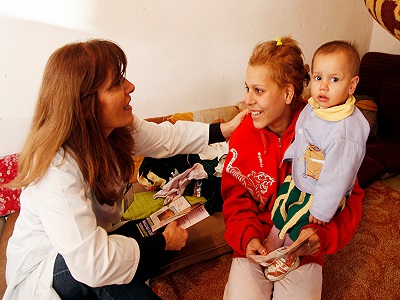© UNICEF/UN038332/McConnico
Findings of research in neuroscience and parenting, provide evidence on the lifelong benefits of investing in the earliest years. At the same time, research findings have demonstrated that home visiting programs can increase parental well-being and parenting efficacy, as well as child outcomes.
The courses contained in the resources for home visitors were designed to upgrade and enhance the role of home visitors and to provide them with essential knowledge and tools to support and engage the families of young children. Well-trained, respectful, sensitive and family centred home visitors can build on this motivation and contribute to strengthening parenting competencies family resilience and children well-being.
The modules were prepared through a consultative process involving international and regional experts, national trainers and home visiting professionals. Because cultural values and beliefs mediate parenting, these generic courses can be adapted to specific country contexts and enriched with local examples and tools.
The courses encourage home visitors to take a strengths-based approach, to promote robust caregiver-child relationships and contribute to reducing risk by supporting and referring families to other services as needed. We trust that training based on these courses will enable home visitors to develop positive, respectful and sensitive relationships with families; help them to assess regularly the strengths and needs of individual children and their caregivers; and assist them in supporting and empowering parents for informed actions and decisions concerning their young children’s health, wellbeing and development.
Learning objectives
At the end of this course, you will be able to:
- Reflect upon and explain to the important role professionals as you play in improving the lives of children and families.
- Detail key elements of home visiting professional practice necessary for successful service delivery.
- Identify principles that support effective working and liaison between professionals from health and other sectors.
- Explain approaches for raising concerns and taking action to safeguard the interests of young children.
Methodology
This course is composed of three sections, including various examples, activities and assessments. This e-learning activity can be taken as stand-alone course or as part of the Home Visitors resources modules for Home Visitors and Care takers.
Audience
- This course is intended for home visitors and home nurses to learn important information about role they play when working as home visitors, so they can engage with parents and caretakers on developing children potential.
- This course is also open to parents, caregivers, UNICEF staff and UNICEF partners.
Length
It will take you about 1.5 hours to complete this self-paced course.
Structure
This course is composed of three sections:
- Introduction
- Section 1
- Section 2
Contact details
For technical issues, please contact the Agora team (agora@unicef.org)
For content queries, questions and suggestions please contact Silvia Sanchez (sasanchez@unicef.org) Aleksandra Jovic (ajovic@unicef.org)
